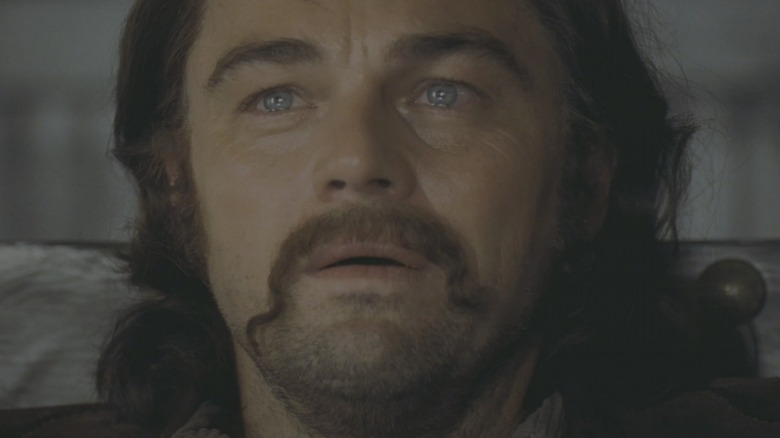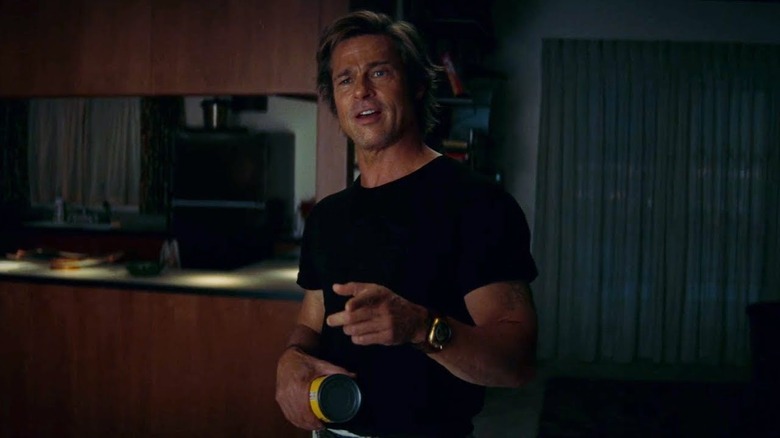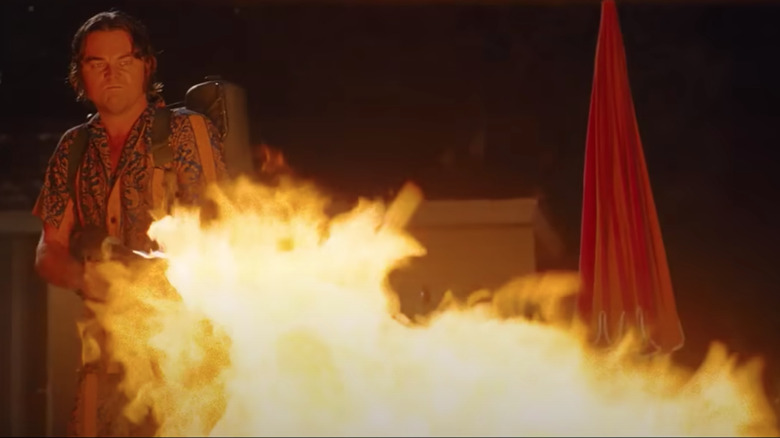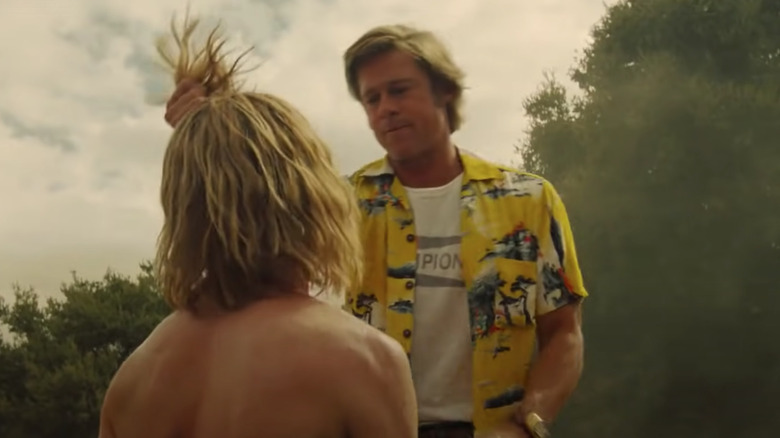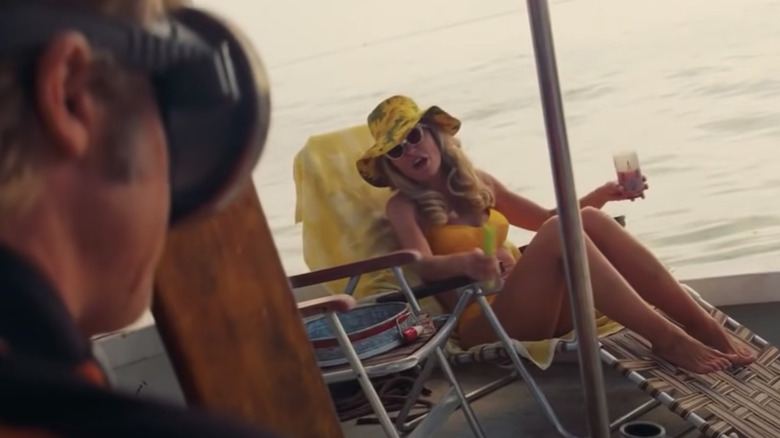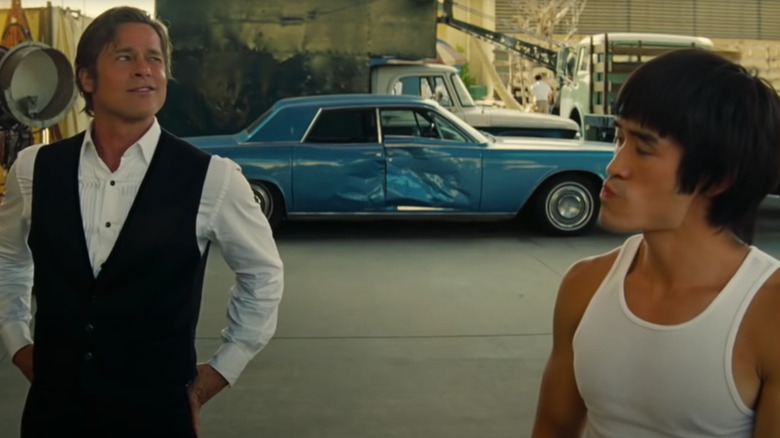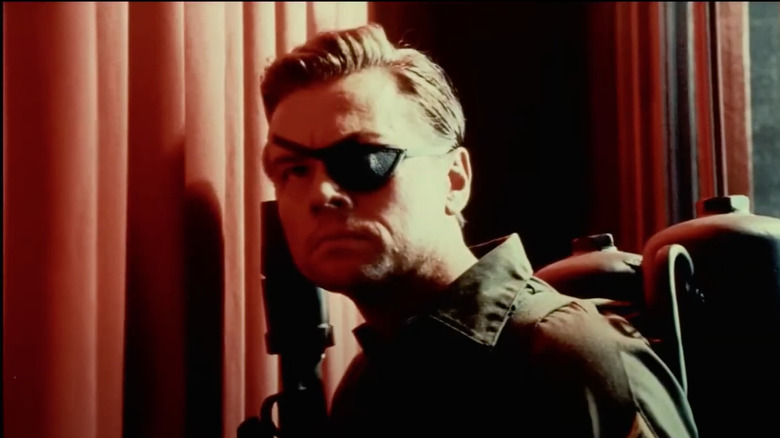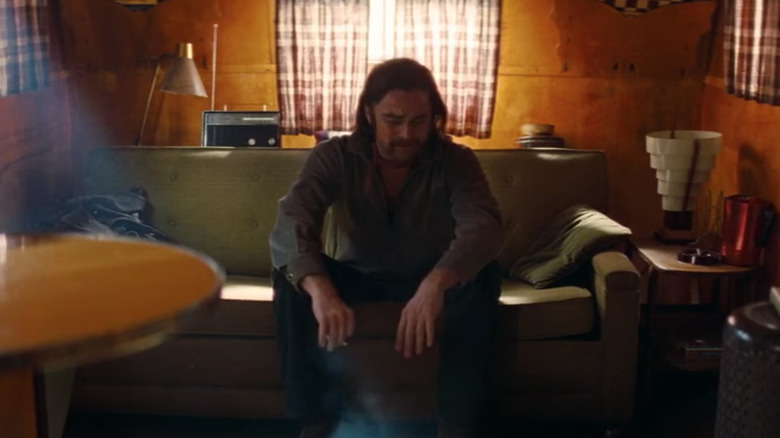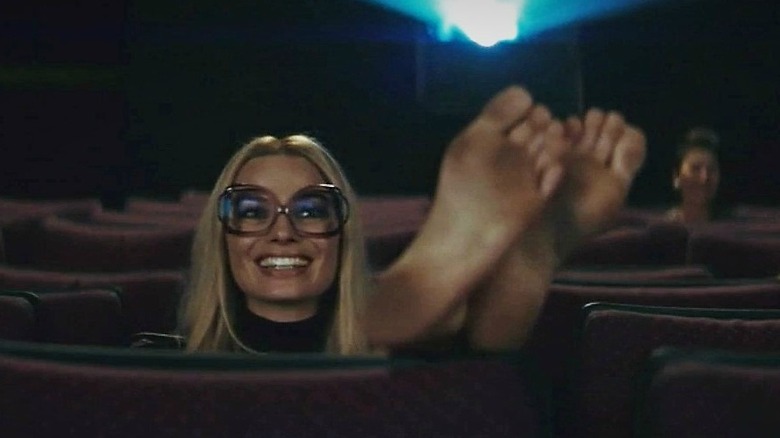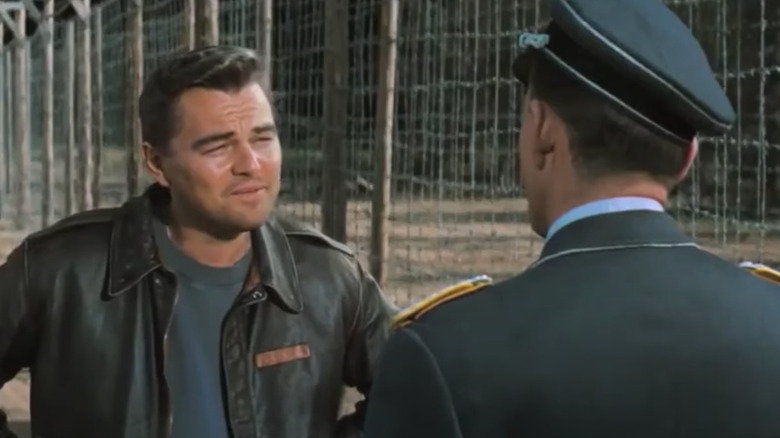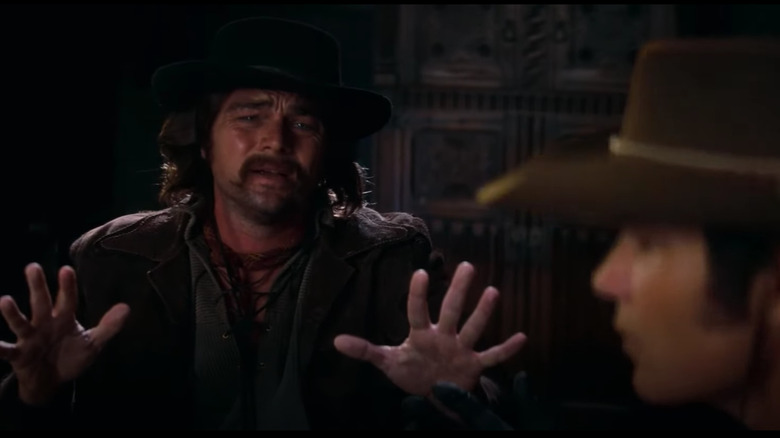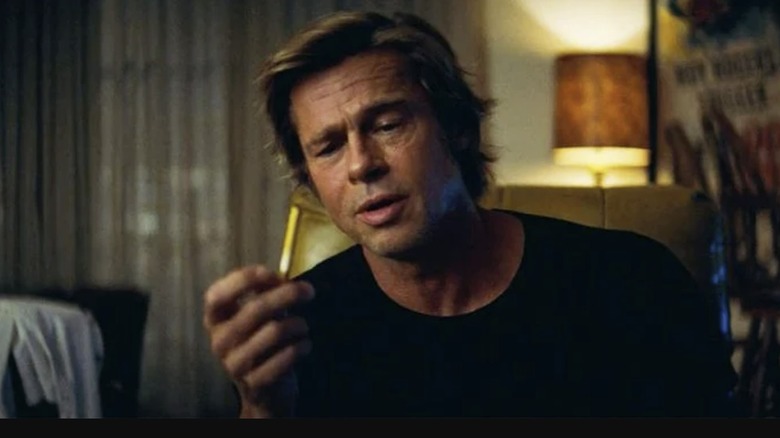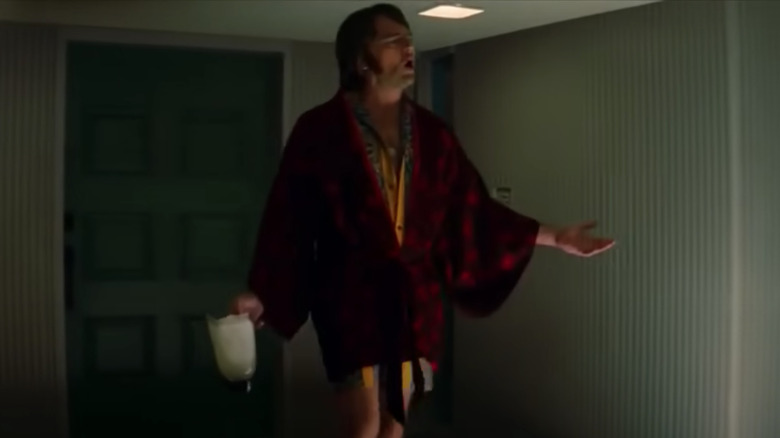Once Upon A Time In Hollywood Scenes That Went Too Far
We love us some "Once Upon a Time in Hollywood," Quentin Tarantino's wickedly funny love letter to all things Tinseltown. Starring Leonardo DiCaprio, Brad Pitt and Margot Robbie, the pic chronicles aging actor Rick Dalton (DiCaprio) as he navigates the treacherous waters of Los Angeles alongside his stunt double Cliff Booth (Pitt). Meanwhile, we also enjoy the exploits of Sharon Tate (Robbie) in the months leading up to her tragic death at the hands of the Manson family in 1969.
As usual, Tarantino brings his trademark dialogue, humor and violence to this twisted tale of Hollywood decadence that's driven by strong, award-winning performances from its main cast, stunning photography and enough twists and turns to keep viewers invested throughout its lengthy three-hour runtime.
Praises aside, Tarantino does occasionally lean too hard on the excess and, at times, pushes things a little too far for comfort. Here are the "Once Upon a Time in Hollywood" scenes we felt went a little too far.
Cliff vs. the Manson gang
The big moment that Quentin Tarantino builds towards at the climax of "Once Upon a Time in Hollywood" sees Cliff Booth take on the members of the Manson cult who murdered Sharon Tate and her friends in August 1969. Except in the film, the killers don't make it to Tate's home because their attention is diverted to Rick Dalton's house, where they find a bewildered Cliff tripping on acid. Cliff has already attacked one of the Manson gang earlier in the story, prompting leader "Tex" Watson Jr. (Austin Butler), to threaten the stuntman with a gun.
Bad idea.
Cliff retaliates and easily fends off his attackers. What follows is a shockingly violent confrontation that's played mostly for laughs, and audiences get to "enjoy" watching these horrible people get their just desserts in this fictionalized universe. While it's certainly satisfying to see the swift justice enacted on such vile individuals, Tarantino takes things a little too far to the point where you almost feel sorry for them. After all, in this version of history, they hadn't yet committed murder, which makes Cliff's brutal actions tough to stomach.
Rick murders someone with a flamethrower
In the same sequence, Cliff nails one of the Manson clan between the eyes with a can of dog food, blinding the young woman and causing her to burst into hysterics. Eventually, she smashes through the back door and ends up in the pool where Rick Dalton is rehearsing lines of dialogue. He's startled by her presence, sees the gun in her hand and quickly leaps off his raft. After climbing out of the pool, he makes for the shed and reemerges with a flamethrower prop from one of his previous films. Without a moment's hesitation, the actor pulls the trigger and incinerates the flailing woman until she's darn near charred to a crisp.
The moment is so over the top that it induces more laughs than gasps, which is probably by design. Trouble is, Rick's actions are completely unwarranted within the context of the film. Again, this entire finale is basically Tarantino dishing out his own brand of justice against real-life murderers, but considering that Rick a) had no idea who the young woman was and b) was not in harm's way at any moment during the confrontation, the situation probably warranted a slightly less exaggerated response.
Cliff beats up a hippie
During a particularly creepy scene in "Once Upon a Time in Hollywood," Cliff ventures with a young woman to Spahn Ranch, where a large contingent of Charles Manson's followers reside. With the ranch doubling as a movie set a few years back under the supervision of Cliff's old buddy George Spahn (Bruce Dern), its current residents prompt Cliff to make sure ole George isn't lying dead in a ditch somewhere.
Naturally, the tense scene gives way to hilarity when Cliff finds George lying in bed, ornery as ever and very much aware of the weird people lingering about his property. Slightly humbled, Cliff makes to leave but finds a knife stuck in the wheel of his car and a snickering hippie lingering nearby. Angered, he grabs the shirtless Manson follower and proceeds to beat the living hell out of him until he rectifies the problem.
Tarantino uses this moment to show Cliff's near superhuman levels of strength, grit and confidence, but his actions seem a little excessive considering he was the one who intruded upon the property in the first place. Again, knowing the true history of the Manson family, this scene should evoke cheers. But in the context of the film, Cliff goes one step too far to make his point.
Cliff murders his wife
"Once Upon a Time in Hollywood" incurred a fair bit of controversy when it revealed that Cliff may have murdered his wife — a tidbit meant to echo the mysterious death of famed actress Natalie Wood. In a flashback-within-a-flashback sequence, we see the stuntman meandering about his boat, a beer in one hand and a harpoon gun in the other. His wife Billie (Rebecca Gayheart), sitting in a lawn chair at the bow of the craft, drunkenly insults him. Cliff calmly sits in a seat opposite her and seems to subconsciously aim the gun towards her before the scene ends abruptly.
Tarantino reveals in his novel for "Once Upon a Time in Hollywood" that Cliff did indeed kill his wife, but doesn't confirm whether the action was accidental or intentional. We do learn that he tried to save her and that there wasn't enough evidence to convict him. We also learn that Cliff has killed other people in fits of rage, which makes his actions throughout the movie a tad, ah, questionable.
That said, having your main protagonist linked to a murder doesn't seem like the best move. One could argue that Tarantino was simply painting a world full of flawed Hollywood types, all of whom have nothing beyond their feeble acting talent, but this moment still feels like one step too far — especially since Cliff doesn't appear too bothered by the event over the course of the film.
Cliff vs. Bruce Lee
Much has been made about the controversial depiction of legendary actor Bruce Lee in "Once Upon a Time in Hollywood." As portrayed by Mike Moh, the famed martial arts expert and actor is depicted as an arrogant jerk — one who talks too much and completely disrespects everyone.
In a brief flashback, Cliff lands a job on "The Green Hornet" TV show alongside Lee. The latter boasts about how he would cripple Cassius Clay (aka Muhammad Ali) if they were to ever lock horns, a statement that induces snickers from Cliff and results in a "friendly contest" between the two actors. Lee takes the first round with a violent jump kick to Cliff's chest. "Do that again," Cliff beckons. Lee takes the bait and ends up in the side of a car.
Round three ends prematurely, but audiences get the gist: Cliff is powerful enough to go toe-to-toe with a legendary figure like Bruce Lee, which cleverly sets up his final confrontation with the Manson murderers.
But according to Lee's daughter, Shannon, the depiction of the "Fists of Fury" star is far from accurate. "It was really uncomfortable to sit in the theater and listen to people laugh at my father," she told The Wrap when the film was first released. Tarantino has defended Mike Moh's performance several times and cited various sources that seemingly legitimize the scene, but perhaps the famed director should have consulted with Lee's family before dragging his legacy through the mud.
Rick vs. the Nazis
In another scene that feels more like Tarantino indulging himself than a necessary story beat for the plot of "Once Upon a Time in Hollywood," Rick Dalton appears in a World War II film brandishing a flamethrower he subsequently uses to fry some Nazi soldiers. Sure, the sequence explains why Dalton has a working flamethrower in his house for the climax of the film, but it also feels tonally out of place within the context of the story.
"Anybody order fried sauerkraut?" Dalton exclaims before incinerating the villains with his weapon.
While there are a number of films from the era that reveled in extreme violence — "Bonnie and Clyde," "The Wild Bunch" and "Night of the Living Dead," for example — the murder and mayhem never felt egregious. In Rick's scene, Tarantino strives for shock humor but the moment doesn't look, feel or sound like anything Hollywood would have produced in the 1960s. Instead, the bit plays more like a lost scene from the director's own "Inglourious Basterds," and is far too absurd to be taken seriously.
Rick's meltdown
Rick Dalton's defining moment in "Once Upon a Time in Hollywood" arrives when he flubs a line during a film shoot and subsequently suffers an emotional breakdown in his trailer. The man curses, cries, drinks, breaks everything in sight and essentially loses control for a good two minutes.
Said scene is undeniably impressive from an acting standpoint, even more so when you realize DiCaprio improvised much of his character's actions and dialogue. The problem is that the bit goes on for far too long, to the point where Tarantino loses his desired effect and makes his protagonist more pathetic than sympathetic. Was that the aim?
Also, while impeccably acted, the moment feels a little out of character for the great Rick Dalton. Yes, he's an insecure actor — we learn as much in the opening scene when he cries upon learning of his declining career — but this sequence paints him as borderline insane. The fact that he never again reaches such an erratic state throughout the rest of the picture — presumably because he achieves something of a moral victory during his big acting moment with Trudi Frazer (Julia Butters) later on — renders his breakdown more confusing than exhilarating.
Tarantino's foot fetish
By now it's common knowledge that Tarantino loves him some feet. Check out any one of his films and you're sure to find any number of shots highlighting the toes, foot or feet of the characters in the story. Be it Diane Kruger in "Inglourious Basterds," Uma Thurman in "Kill Bill: Vol. 1" or Sydney Tamiia Poitier in "Death Proof," the prolific director is as linked to the southern extremities as Tom Hanks is to relieving himself on camera.
"Once Upon a Time in Hollywood" does nothing to alter the course of the discussion. To put it mildly: there are a whole lotta feet in "Once Upon a Time in Hollywood," mostly of the female variety. We see Margot Robbie's Sharon Tate rest her bare soles on the back of some chairs in a movie theater, Pussycat (Margaret Qualley) spends the entire film flaunting her toes for all to see and DiCaprio even loses the shoes long enough for Tarantino's camera to linger on his appendages.
All told, according to The Sun, there are 36 shots of bare feet in this movie, resulting in nine minutes and 47 seconds of screentime, which seems ... excessive.
No judgment here. As Tarantino told GQ: "There's a lot of feet in a lot of good directors' movies. That's just good direction." We're inclined to agree, but this is still an instance of Tarantino going a little too far with his visual flourishes.
Rick in The Great Escape
At one point in "Once Upon a Time in Hollywood," we learn Rick was set to star in "The Great Escape" in the Steve McQueen role. Unfortunately, McQueen had a change of heart and ended up taking the part of Hilts, "The Cooler King," resulting in immense success for the already prolific actor.
As Rick recalls the story to fellow actor James Stacy (Timothy Olyphant), we see the pain on his face at having missed out on such a massive opportunity. It's actually a quietly poignant moment that's meant to further connect audiences with this strange actor.
For whatever reason, though, Tarantino opts to undermine the drama by intercutting the conversation with shots of Rick as Hilts in "The Great Escape" via "Forrest Gump"-style FX. While it's certainly fun to see DiCaprio appear in such a classic film, the comedic beats detract from the emotion of the scene. It's enough to see Rick's anguish at missing out on such an enormous opportunity without needing to literally see him in "The Great Escape." We get the gist.
According to The Insider, the sequence "implies that Dalton really might be downplaying how close he was to getting the Hilts role. And that's probably why he doesn't like to talk about it." Fair enough, but we would counter that DiCaprio is a good enough actor to convey such information to an audience without so much interference. This guy won an Oscar for rolling around in a bear coat, for Pete's sake!
Rick's flubbed line
Before Rick's big meltdown, we watch him perform in a TV production — a long scene that culminates in a dramatic discussion between his character and co-star James Stacy. Things are running smoothly when Rick suddenly forgets his dialogue and forces the entire production team to reset.
DiCaprio is terrific in the scene, but at just over eight minutes, it drags on for far too long. We see cowboys riding into town, a standoff outside a saloon and a long-winded conversation that begins at a bar and eventually makes its way to a table. Rick then botches the final line in a manner that plays more like the punchline to a long-winded Norm Macdonald joke than a necessary character beat.
What do we learn from this extended sequence? That Tarantino loves television production almost as much as he loves feet. While the scene certainly works from an acting perspective, it also reeks of overindulgence on behalf of the prolific director.
Cliff takes acid
Late in the film, we discover that Cliff purchased a cigarette dipped in acid from a hippie. He stores the item on his person for a time and then decides to light 'er up and turn in for the night. As the sensation finally kicks in, the Manson murderers, led by Tex, burst into the house and threaten Cliff's life.
Now, the fact that he's tripping on acid could explain why Cliff is so nonchalantly violent towards the invaders and utterly unsympathetic to the deceased once the chaos subsides. The drug seemingly affects his mind in a manner that dulls his senses, so much so that he doesn't even notice when one of the attackers stabs his leg with a knife.
Still, this particular character beat doesn't lend much to the story and feels more intrusive than necessary. We follow Cliff around Rick's house as he slowly deteriorates into a cloud of giggles and paranoia, mannerisms that run contrary to the rigid, extremely in-control demeanor the stuntman displayed in the previous two hours. Why did Cliff have to take acid? Was it essential to the story in any way, shape, or form, or merely a baseless gag designed to provide levity to the dark finale?
At any rate, this feels like Tarantino excess — a beat that certainly induces laughs, but could just as easily be excised from the picture without losing much of anything.
Rick yells at hippies
Finally, just before the big climax, Rick catches wind of the Manson gang noisily driving around the neighborhood in their 1959 Ford Galaxie. Rick has made his disdain for hippies well known throughout the picture, so it comes as no surprise when he runs out of his house and chastises the group for coming onto his street to "smoke dope." The actor appears incredibly erratic during this bit, even after Tex tells him they just got lost.
"Look, chief," Dalton screams, pointing a finger in Tex's bewildered face, "You don't belong here. Now, take this mechanical a****** and get it off my f****** street!"
The point of this is to give the Manson bunch a reason to invade Rick's home rather than Sharon Tate's, but it feels contrived and completely unnecessary. Why not just have Tex and company spot Cliff walking his dog? That seems like the simpler, more natural route for the script to follow.
As it stands, Rick comes across as crass. He might as well be an old man yelling at kids to get off his lawn. Again, given the actual history of the Manson family, audiences likely welcome anything that comes their way. Within the context of the film, however, Rick comes across like a jerk in dire need of a tune-up, which doesn't seem appropriate at this stage in the production.
